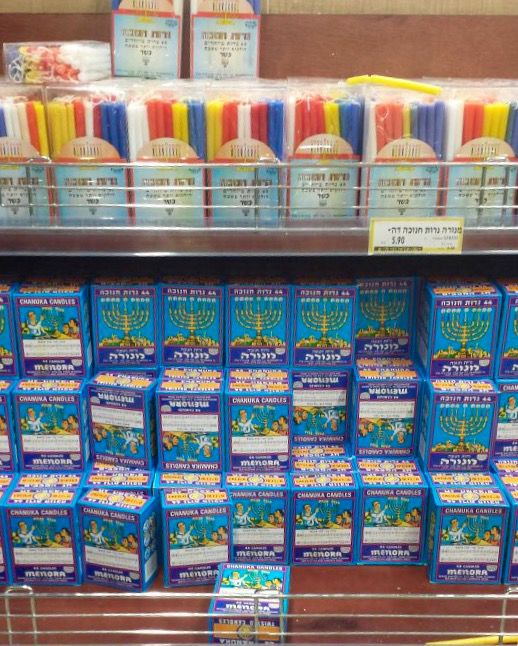Photo/Menorah Candle Co.
SDEROT, Israel – The Menorah Candle Co., manufacturer and exporter of millions of Chanukah candles worldwide, is one of the oldest businesses in the industrial zone of Sderot, the Negev city better known as a frequent target for Hamas rockets than for its commerce.
Menorah produces the small bright-blue box filled with 44 multicolored candles and printed with iconic images designed by Boris Schatz of the early 20th-century Bezalel art movement. This simple box of candles has been a trusted Chanukah holiday component for Jews around the world for decades.
Today, the factory is run by an idealistic CEO, Ilan Ben Moshe, who considers the operation a business and a national mission. The factory was moved to Sderot from Tel Aviv in 1988 by its previous owner, a Holocaust survivor, who bought the company from its founders. The original business started in 1939 as the first candle manufacturer in Palestine. Menorah now employs 40 workers, all residents of Sderot and the surrounding area.
“We’ve gone through two wars here in the past four years,” said Ben Moshe, referring to Israel’s eight-day Operation Pillar of Defense in November 2012 and Operation Protective Edge in the Gaza Strip in 2014. “Sderot is less than a mile from Gaza and has been under fire for 14 years, but people here are very brave.”
On a recent afternoon, Ben Moshe invited a visitor into the operation and the large protected area, where workers take shelter when Israel’s Red Alert siren gives a 15-second warning of an imminent rocket attack.
In the 2012 war, Menorah was forced to close for 10 days when the area came under frequent bombardment, and anxiety among workers was a constant companion.
In June 2014, a direct rocket hit on a nearby paint factory was one of the attacks that brought Israel into the month-long Gaza War. The factory was completely destroyed in the attack, and four workers were injured.
When that happened, Ben Moshe, who makes the 90-minute commute from Jerusalem every day, said he considered moving his factory to the Jerusalem area, but, ultimately decided to “stay here forever. I consider it our mission to be here.”
“Candles have soul,” Ben Moshe asserted. That’s what attracted him and two partners to buy the veteran company in 2012, after a successful career as a vice president of several large Israeli corporations and a brief experience producing candles in Turkey.
Ben Moshe, 44, the son of a Canadian-born mother and an Iraqi father, served as an IDF paratrooper and is the father of four. An observant Jew, he takes pride in providing for the religious needs of Jews worldwide.
He’s quick to note that Menorah has expanded over the years to produce and export Shabbat candles, memorial candles, Havdalah candles, and, in the last Chanukah miracle of a single cruse of oil lasting for eight days in its original form.
Individual oil cups now constitute 15 percent of Menorah’s Chanukah trade, a number Ben Moshe expects to rise as more Jews abroad adopt the olive oil custom.
The company tries to locally source paraffin, wicks, olive oil and dye, all the components that go into making the signature candles.
A parallel part of the Menorah ethos is providing employment and occupational therapy to local people with special needs. Ten of the 40 workers at the 75,000-square-foot-plant are from the special needs community and are involved in various aspects of packing and shipping thousands of oil cups and candles daily.
Commercial candle making is a relatively simple but exacting process using paraffin and oil. The Sderot plant uses machinery manufactured and imported from Germany and China some 30 years ago that still functions well today. The wicks are eight-layers strong to create a steady flame. To create different colors, sizes and shapes of candles, many kinds of paraffin additions are required.
To keep up with demand and an exacting export schedule, production starts four months ahead of the holiday. Menorah’s biggest customers outside of Israel are in North America, France, Australia and South Africa, with business growing an average of 10 percent every year, Ben Moshe said.
One last stop on the factory tour is the small synagogue on its premises that is used for daily Torah study. Ben Moshe reflects on the candle legacy he’s perpetuating and growing bigger.
“God sent me here,” he said with a smile.











